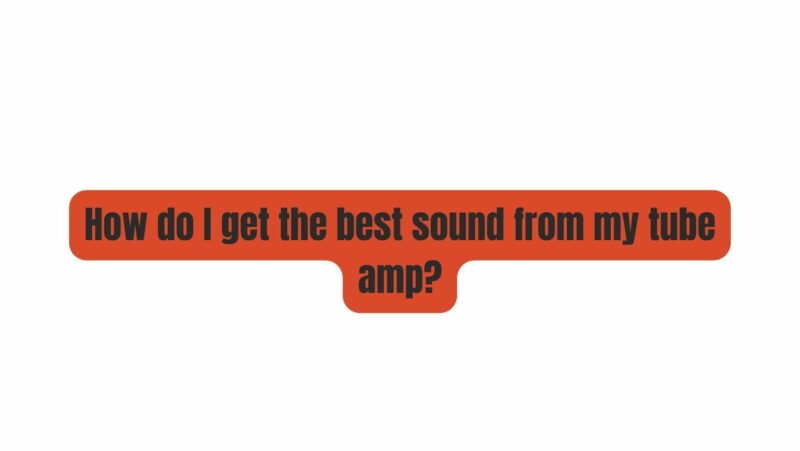Tube amps are a popular choice for many musicians because they offer a warm, rich sound. However, getting the best sound out of a tube amp can be tricky. There are a few things you can do to get the most out of your amp and achieve the sound you are looking for.
Choosing the Right Tubes
The tubes in your amp are responsible for the amp’s sound. Different tubes will produce different sounds, so it is important to choose the right tubes for the music you play. If you are not sure what tubes to choose, ask a qualified technician for help.
Here are some of the most common types of tubes used in guitar amps:
- Preamp tubes: These tubes are responsible for shaping the sound of your guitar before it is amplified. They are typically made of either 12AX7 or 12AT7 tubes.
- Power tubes: These tubes amplify the signal from your preamp tubes. They are typically made of either EL34 or 6L6 tubes.
The type of tubes you choose will affect the overall sound of your amp. If you are playing blues or rock music, you may want to choose 12AX7 preamp tubes and EL34 power tubes. If you are playing jazz or country music, you may want to choose 12AT7 preamp tubes and 6L6 power tubes.
Biasing the Tubes Properly
The tubes in your amp need to be biased properly in order to function properly and produce the best sound. If the tubes are not biased properly, they can overheat and damage the amp. It is important to have the tubes biased by a qualified technician every few years.
Biasing is the process of adjusting the voltage that is applied to the tubes. This voltage determines how much current flows through the tubes, which affects the sound of the amp.
There are two types of bias:
- Fixed bias: This is the most common type of bias. The voltage is set at a fixed level and does not change.
- Cathode bias: This type of bias is more complex, but it allows the voltage to vary depending on the current flowing through the tubes. This can give the amp a more dynamic sound.
The type of bias you choose will affect the overall sound of your amp. If you are not sure which type of bias is right for you, ask a qualified technician for advice.
Using a Good Guitar Cable
A good guitar cable will help to ensure that the signal from your guitar is not degraded. A poor-quality cable can introduce noise and distortion into the signal, which can affect the sound of your amp.
When choosing a guitar cable, look for one that is made of high-quality materials and has a good shielding. You should also avoid cables that are too long, as this can also introduce noise.
Experimenting with the Settings
The best way to find the best sound for your amp is to experiment with the settings. Try different combinations of gain, volume, and tone controls until you find a sound that you like.
There are no right or wrong settings, so feel free to experiment until you find what works best for you. However, there are a few general tips that can help you get started:
- Start with the gain control set low and the volume control set high. This will give you a clean sound that you can then shape with the tone controls.
- Use the tone controls to adjust the sound of your amp. The bass control will affect the low frequencies, the mid control will affect the midrange frequencies, and the treble control will affect the high frequencies.
- Experiment with different pickup settings on your guitar. The pickup settings will affect the overall sound of your amp.
Using the Right Speakers
The speakers in your amp are responsible for converting the amplified signal into sound. The type of speakers you use will affect the sound of your amp.
If you are not sure what speakers to use, ask a qualified technician for help. They can help you choose speakers that are right for your amp and your music.
Placing the Speakers Properly
The placement of the speakers in your amp can also affect the sound. If the speakers are too close together, they can sound muddy. If the speakers are too far apart, they can sound thin. Experiment with different placement until you find a sound that you like.
Keeping the Amp Clean
Dust and dirt can build up on the components in your amp and affect the sound. It is important to keep your amp clean by dusting it regularly.


